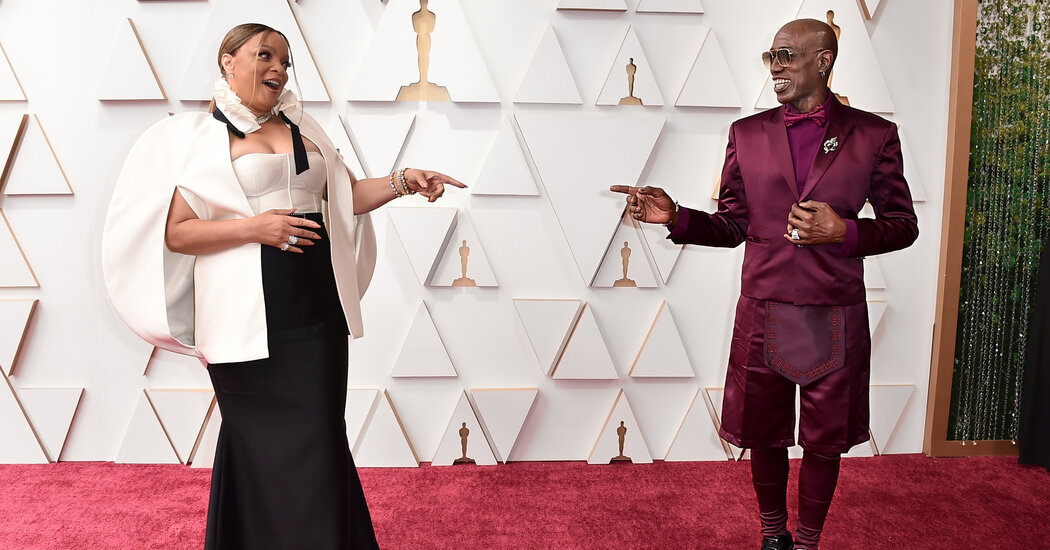
Last year, their work transported audiences to Paris and to Graceland, to an underwater kingdom, to parallel dimensions with googly-eyed rocks and hot dog fingers — and to the decadent depths of 1920s Hollywood.
Throughout their careers, the five nominees for this year’s Oscar for costume design have dressed dozens of movie stars and entire armies of extras, collectively picking up eight Academy Awards along the way. So what happens when they turn their expert eyes inward and become the main characters for an evening?
“There’s a decision that we have to make: whether or not we go outside to a big fashion designer,” said Ruth E. Carter, speaking from Los Angeles a few days before the ceremony. “Or we say: We have the resources. We have the know-how. We have the ability to make beautiful fashions that we can actually adorn ourselves in and be comfortable in, and represent ourselves. So that’s what I’m doing. I’m representing myself.”
In 2019, Ms. Carter became the first Black designer ever to win the Oscar for costume design, taking home the award for “Black Panther.” This year, she is nominated for her work on the sequel, “Black Panther: Wakanda Forever.” Ms. Carter said she planned to wear two outfits on Sunday night, and that one of her looks — a white-toned dress with beadwork — was a tribute to Chadwick Boseman, the star of “Black Panther” who died from cancer in 2020.
“If I were to be thematic about who I am on the red carpet, I feel like I’m somebody real that represents Afro-future because of who I am,” she said. To realize her vision, she enlisted the cutters Tamara Cobus and Rory Cunningham. (In the film world, a cutter makes patterns and cuts, fits and constructs garments based on a costume designer’s sketches.)
Jenny Beavan — who won the Oscar last year, for “Cruella” — and Mary Zophres went a similar route with their Oscars outfits, working with industry friends and collaborators to bring their own visions to life, dressing themselves as they might dress a character.
For Ms. Beavan, that meant using her Oscars ensemble to pay homage to the title character of her film, “Mrs. Harris Goes to Paris,” and assuming an awards-season uniform of sorts. In the film, Mrs. Harris is a London house cleaner whose passion for a Dior dress takes her on a journey to Paris to buy a designer gown of her own. Ms. Beavan’s planned Oscars outfit, which she also wore to the BAFTAs and the Costume Designers Guild Awards, is “a homage to a cleaning lady” with a “nod to Dior,” she said, and was made by a friend, the cutter Tim Perkins. It features a polka-dot pinafore and headband as well as a feather duster, which she “thought would be a fun accessory, to go around sort of dusting people down.”
Ms. Zophres, who is nominated for her work on “Babylon,” said that she planned to wear a dress of her own design, cut by José Bello. “This way, you’re never going to be wearing something that someone else is going to be on the carpet in,” Ms. Zophres said. She described her Oscars dress as a fuchsia pink, in a shade similar to that of a two-piece suit she wore to the nominees luncheon last month. “It’s a fun dress,” she said, adding that it was “danceable and energized.”
Shirley Kurata and Catherine Martin went in a different direction with their Oscars looks, ceding the reins to fashion designers.
In an email, Ms. Kurata said she planned to wear custom Rodarte. In studying Oscars looks through the years, she was especially drawn to a sequined Arnold Scaasi outfit that Barbra Streisand wore in 1969, and took that as inspiration for her own dress. Ms. Kurata added that her dress was hand-sewn and red, to nod to a “dominant color” in her film, “Everything Everywhere All at Once.”
“It is also a color in the Chinese culture that symbolizes luck, joy and happiness, which also mirror the feelings I have about the movie and my Oscar look,” she wrote.
In an interview, Ms. Martin said that she and her husband, the director Baz Luhrmann, would wear Prada on Sunday. Ms. Martin, who is nominated for her work on “Elvis,” said that she loved the feeling of, “on a special occasion, not having to make my own outfit.”
“That feels like a treat, not work,” she said.
“As I’ve gotten older, I’ve got more and more comfortable with being part of the celebration and being happy to be at the dance with everyone else and less self-conscious — less feeling like I’m a backstage person and should just be wearing a black pantsuit,” Ms. Martin said. She added that she planned to wear two looks for the evening: an embellished print dress for the ceremony and a sequined pajama for the after-party.
“My theory about costumes is they’re all clothes,” she said. “However fanciful or removed from reality an outfit is, even in a movie, it still needs to be clothes. I think that costumes are clothes and clothes are costumes, and in a sense we costume ourselves every day.”






